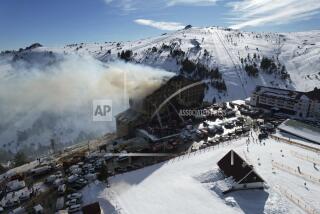Cable Car Fire Exacted Staggering Toll in Tight-Knit Austrian Town
- Share via
WELS, Austria — A stout red candle flickers on Ursula Kipper’s desk, a silent tribute from City Hall co-workers still unable to grasp that her own warmth and light will never again fill the empty third-floor office.
Kipper, 12 city government colleagues and 19 of their friends and family died together in Saturday’s cable car inferno in the Alpine resort of Kaprun during what was supposed to be the City Hall ski club’s annual play-together-and-stay-together outing to enjoy the first weekend of the season.
Now this town of cobblestone streets and pastel-colored baroque houses is shrouded in silence and black bunting. Christmas wreaths hanging over the narrow shopping streets are being left unlighted during this week of civic mourning, casting their own pall of sadness as they waft in the wind.
Only two of the 34 Wels skiers survived the trip--City Hall maintenance chief Franz Aicher, who took advantage of Saturday’s splendid weather by taking a slower gondola ride up Kitzsteinhorn mountain, and a retired policeman, Ernst Hemedinger, who skipped the doomed route through a mountain tunnel to keep Aicher company.
“They are just devastated--we all are,” city information chief Wolfgang Ortner said of the two survivors. “It was just pure coincidence that they didn’t get on that train.”
Police investigating the disaster in Kaprun, which killed at least 156 people and perhaps as many as 171, disclosed Tuesday that they had found the first possible clue to the cause of the blaze, which engulfed the cable car after it had traveled half a mile through a two-mile tunnel.
An oily substance was found on the doomed carriage’s rails that might have ignited from friction from the cables or an electrical fault, said police technical inspector Christian Tisch. The substance will undergo a chemical analysis and further inspections that could take several more days, he added.
The gruesome accident’s blow to Wels, population 60,000, is staggering: It orphaned three children here and cut a swath through the hearts and commerce of nearly every household and business. But what intensifies the pain for the city workers is that the ski resort disaster was the second horror to befall colleagues on an outing. In 1983, when a group of Wels residents was on a sun-seeking vacation to Turkey, fire consumed a hotel in Istanbul and 11 of them died.
“Some of us have now lost friends to two unthinkable disasters,” said Ortner, a soft-spoken man with white hair who is neither a sunbather nor a skier.
The Wels skiers all left on a chartered bus Friday morning and spent the night at Kaprun’s Waidmannsheil Hotel as arranged by the ski club leader, 43-year-old Manfred Schoenhuber, who was Kipper’s boyfriend.
“The losses touch every department. It’s unbelievably horrible, and we just can’t come to grips with it yet,” Ortner said as he tended the candle memorial to Kipper, whose office is next to his own. “Every time I walk by her door, it’s like realizing all over again that these colleagues are gone.”
Black grosgrain ribbons mark the offices of the 13 lost city workers, and a memorial display of their pictures and details of their service to the 1,250-strong city government gives pause to the few people still trying to go about their business in City Hall. Outside, hundreds of graveyard candle lanterns carpet the sidewalk.
“I worked with her in the kindergarten for years. She was always so funny, telling jokes and making us forget we were even at work,” one retired nanny from the City Hall day-care center said as she brushed away tears with one hand and pointed with the other to the picture of Bettina Emrich, a 34-year-old with a big smile and permed hair.
At the Hotel Greif, grim employees clad in black have posted a picture of 27-year-old Martin Riha, with a note of apology to guests for being so helplessly shattered.
“He was a wonderful co-worker--always in a good mood and friendly,” the hotel director, Christine Backfrieder, said of the reception chief who decided just before the City Hall trip to accompany his new girlfriend, Nina Humer, who worked in the city’s legal department.
Makeshift memorials of flowers and candle lanterns mark places of work throughout Wels’ warren of narrow streets. In one of the pedestrian shopping zones, a hand-lettered sign outside the Salon Hairline announces indefinite closure while the staff mourns one of its stylists and several customers.
“What is God thinking about us, to send our people into two such terrible disasters?” one woman, her mascara running from her tears, wondered aloud as she lighted a candle below the salon’s brass nameplate.
The local Red Cross office has offered counseling for the grief-stricken friends and relatives, and a special account has been opened to take donations. Although Austria’s national mourning officially ended Sunday, Wels’ will last until Saturday, when a memorial service will be held in the Welser Boschhalle public building.
In addition to the victims from Wels, the small province of Upper Austria to which it belongs suffered 21 other losses in the Kaprun inferno, accounting for more than half of the 92 Austrians among the dead.
“This is the worst blow of fate in Wels in 50 years,” said a distraught Mayor Peter Koits, alluding to World War II as the last disaster to inflict so much suffering and pain.
More to Read
Sign up for Essential California
The most important California stories and recommendations in your inbox every morning.
You may occasionally receive promotional content from the Los Angeles Times.














